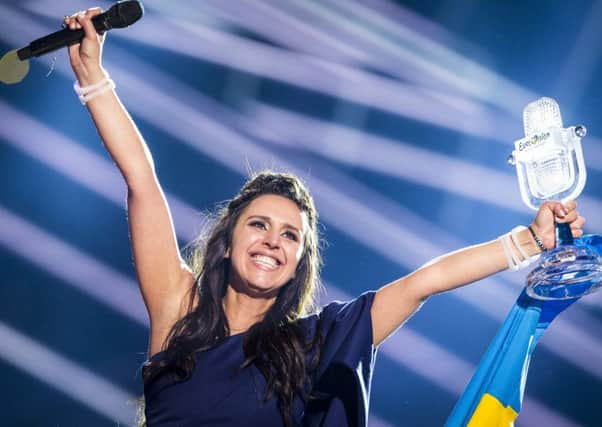Ukrainian Eurovision winner takes veiled swipe at Russian rival


Jamala, who is a Tatar, had insisted her song about Stalin, Crimea and claims of ethnic cleansing did not break Eurovision’s ban on political songs because it was a tribute to her great-grandmother.
Her triumph pushed Russia, who had been the favourite ahead of the final, into third place behind Australia.
Advertisement
Hide AdAdvertisement
Hide AdThe song 1944 opens with the English lyrics: “When strangers are coming, they come to your house, they kill you all and say ‘We’re not guilty’.”
It could be regarded as an attack on Russia, but Jamala has insisted there is no political context, saying: “For me personally, music is about feelings. Politics doesn’t have feelings.”
The track was allowed because officials said the lyrics alluded to history rather than politics.
In a press conference after her win, she said: “I was sure that if you sing, if you talk about truth, it can really touch people and I was right.”
She said she had listened to the soundtrack to Holocaust movie Schindler’s List while preparing for the competition and added: “I would prefer all these terrible things never happened to my grandmother. I would prefer the song did not exist at all.”
British hopefuls Joe and Jake came a disappointing 24th out of 26 in the contest with their pop song You’re Not Alone, although their performance still won praise from fans.
Australia had previously led the competition but was knocked into second place after the public vote was taken into account.
Advertisement
Hide AdAdvertisement
Hide AdThe country had been invited to participate for a consecutive year after joining the show as a one-off in 2015 to celebrate the event’s 60th-anniversary Building Bridges theme.
The country had the same rights as any other competing country, with votes from a professional jury and the voting public contributing to the final scoreboard.
Picking themselves up after the result, Joe and Jake said they were “thrilled” for Ukraine’s win and congratulated Jamala on her performance, adding they were looking forward to getting home and back into the studio.
A statement said: “We’ve had the experience of a lifetime performing on such a massive stage in front of so many people, we will cherish the moment forever. The British public selected us to represent them and we gave it our all and hope we made them proud.”
Despite finishing so close to the bottom of the table, many voiced their support for the pair.
Phillip Schofield tweeted in consolation that, despite them doing a great job, “you’ll never beat the politics”.
The competition kicked off amid promises it would allow countries to “set aside any differences we have” as Europe faces “darker times”.
Advertisement
Hide AdAdvertisement
Hide AdHosts Petra Mede and Mans Zelmerlow welcomed the audience to the Globe Arena in Stockholm, Sweden, with a reminder the competition was founded in 1954 after Europe had been ravaged by war.
Zelmerlow said: “Once again, Europe is facing darker times.”
Mede added: “Now we set aside any differences we have.”
Graham Norton, who guided UK viewers through the grand final on BBC One, led a toast to his predecessor Sir Terry Wogan during song number nine - which this year was host country Sweden’s entry, If I Were Sorry, performed by Frans.
Norton took over the job in 2009 and was narrating his first Eurovision since Sir Terry died in January.
The late broadcaster was the BBC’s Eurovision commentator for almost 35 years.
As Sweden’s hopeful took to the stage for the ninth song, Norton said the contest was “bittersweet” for him.
He added: “Eight years ago, when I was lucky enough to get this job of commentating, Sir Terry very kindly and graciously phoned me, and the only bit of advice he had for me was ‘Don’t have a drink before song nine’.
“Well this is song nine.”
Advertisement
Hide AdAdvertisement
Hide AdHe added: “So while the crowd here in the Globe Arena cheer on their home boy, I would urge you back in the UK at home to raise a cup, a mug, a glass, whatever you have in front of you, and give thanks for the man who was, and always will be, the voice of Eurovision, Sir Terry Wogan. Sir Terry, this is song nine.”
Justin Timberlake provided half-time entertainment during the competition, opening his special guest performance with his hit Dance With Me before moving on to his new single Can’t Stop The Feeling.